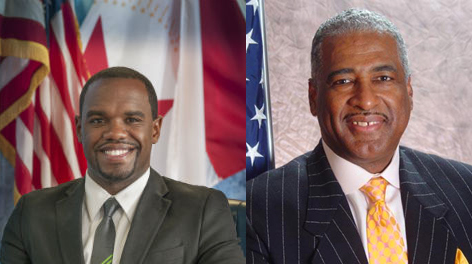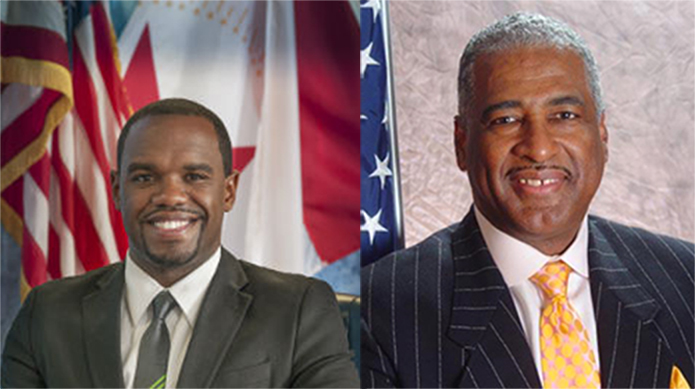
By Barnett Wright
Times staff writer
Go back one month.
The Birmingham City Council passes an ordinance giving itself the management and control of some finances.
Mayor William Bell promptly vetoes the ordinance saying in part that it “creates confusion by its . . . interpretation of the council’s authority as it currently exists under Alabama law, and improper implementation of the policy stated in the ordinance could violate provisions of the Mayor-Council Act.”
Shortly after the veto, state Rep. Oliver Robinson, (D-Birmingham), said he spoke with Bell.
“I talked to the mayor about what’s going on down there at City Hall,” Robinson said. “Nothing is getting done. The mayor sent two documents to me and I passed those documents around to let other members of the delegation see what it is the mayor sent.”
‘Wish list’
The mayor did not send legislation, Robinson said, only a “wish list.”
According to the documents, which were circulated to members of both the local House and Senate, the proposals would rewrite the Mayor-Council Act to require the council to elect a new president every year, thereby limiting the influence of the council’s chosen leader and removing other powers from the council, including its role in making appointments to all city boards and agencies.
A separate proposal would take power to appoint members of the Birmingham Water Works Board (BWWB) away from the city council and give it to the mayor.
April Odom, spokeswoman for the mayor’s office, has said questions and concerns should be directed at legislators. “The mayor does not have a bill in the state legislature,” she has said.
However, Robinson, vice chairman of the Jefferson County House Delegation, said he believes some aspects of the mayor’s “wish list” will be drafted into legislation.
Relations between the mayor and council are at an all-time low, he said.
Among the incidents still being discussed is the mid-December altercation between Bell and Councilman Marcus Lundy.
“After the fight it, hasn’t gotten any better down there (at City Hall). Actually, it’s gotten worse,” Robinson said. “That got us in the legislature thinking about what we might be able to do to help. It’s not going to be done by itself. They’re not going to sit down and work things out. That’s not going to happen.”
Waldrep Law Firm
Some believe the proposals are designed to limit Council President Johnathan Austin, who continues to gain influence among his colleagues and in other areas of the city.
The Birmingham City Council appointed Austin’s friend Kevin McKie to the BWWB last year. And some contend that Austin has been instrumental in getting appointments to several other boards and agencies.
In December, the Birmingham Water Works Board voted to notify the law firm of Waldrep, Stewart & Kendrick that it was being terminated as its legal counsel.
The firm, led by Charlie Waldrep, had earned millions of dollars during its representation of the board for about 28 years.
Water Works Board Chairman Ronald Mims and members Ann Florie and McKie voted to issue a notice to the law firm that the board was terminating its contract.
Among those who believe the Mayor-Council Act needs updating is Waldrep.
“When I read in the media, or watch the media, and see what’s going on at City Hall it saddens me that we don’t have people who are working together,” Waldrep said. “We are not addressing the city’s needs. I think economic development is a huge deal that needs attention. That’s what puts people to work.”
Waldrep, who vehemently denied any involvement in crafting “the wish list” or any potential legislation, also said the Mayor Council Act could be amended to discuss the “best governance model for the city of Birmingham.”
“Maybe that model is that we have a citywide elected president of the city council,” he said, “. . .maybe that model would limit the city council’s president to a two year term.”
Council members say the Mayor-Council Act is fine the way it is and noted that Bell did not push for changes when he served as council president.
The proposals being circulated would give the mayor total control over the city budget and appointment of members to the water works board, Austin said.
“This is not North Korea, this is Birmingham Alabama,” he said.
Among other things the proposal would give the mayor complete control of the city’s $403 million general fund budget and the $140.8 million capital fund budget. It would also remove all “checks and balances” established by the Mayor-Council Act and allow the mayor to appoint all Water Works Board members on behalf of the city without the council’s input or approval, Austin said.
‘Slippery slope’
According to Robinson, all of the items on the mayor’s “wish list” may not come to fruition but he does see some possible changes, including those related to dealing with the council president.
“There’s a consensus in the delegation to have the council elect its president and president pro tem annually,” Robinson said. “The four years of the council president being in power has not worked. The Mayor Council Act has been in place since 1955 and it needs to be adjusted.”
Councilwoman Valerie Abbott sounded a warning about any potential changes to the Mayor-Council Act.
“This proposal that has been brought forth to eviscerate the Mayor Council Act and make a one-sided government is a really slippery slope,” she said. “You may love your current mayor. You may love your current city council . . . but we’re not going to be here forever. If you give all the power to one person and that person in the next election turns out to be a lunatic then what are you going to do?”





